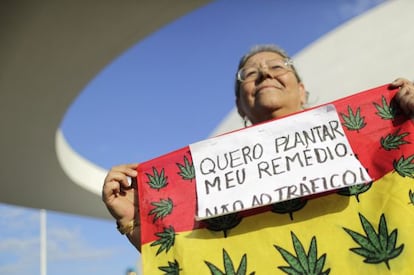Brazil’s presidential hopefuls stay quiet on abortion and marijuana laws
Candidates feel sensitive issues could lose votes in conservative nation with strong religious groups

Staying away from controversial issues appears to be the guiding principle for the main unofficial presidential candidates in Brazil ahead of the October elections.
While other Latin American nations are beginning to debate topics such as abortion and drugs, the government and the opposition in the region’s largest country are steering clear of both.
One of the main questions asked of candidates, whose nominations in these elections will be made official in June, traditionally deals with abortion, a taboo subject.
Brazil allows pregnancy terminations in three cases: rape, accredited fetal deformities and when there is a risk to the mother’s life. In 2007, President Dilma Rousseff, then a minister in Luiz Inácio Lula da Silva’s goverment, told the daily Folha de São Paulo that she supported decriminalizing abortion. But when she was named a presidential candidate in 2010, she backtracked after receiving criticism from religious sectors.
I would not like for Brazil to be the guinea pig for an experience whose end result we don’t know”
Maria José Rousado Nunes, a sociologist and president of the non-profit group Catholic Pro-Choice Women, says politicians avoid the topic of abortion so as not to lose popular support – Brazil is a conservative country with a Catholic majority and a growing number of evangelicals – but also congressional support.
“The government does not take a stand in order to guarantee the loyalty of the parties in its coalition,” she adds. Of the 19 parties in Congress, 14 are part of Rousseff’s coalition government, and many of them have ties to religious sectors.
The only progress made on the subject was the passing of a law last year establishing that the public health system can pay for legal abortions. But before that, the government created a social fund to award a monthly stipend to victims of rape who wish to carry on with their pregnancies.
Meanwhile, neither Aécio Neves of the Party of Brazilian Social Democracy (PSDB) or Eduardo Campos of the Brazilian Socialist Party (PSB) are taking any particular stand on the issue.
Our legislation is adequate. I don’t see the need to change it”
“I support the current legislation without change,” said Neves in an interview with Época magazine.
“Our legislation is adequate. I don’t see the need to change it,” mirrored Campos in statements to the daily Estado de São Paulo.
By comparison, abortion on demand in the first trimester is legal in Uruguay, Cuba and 18 out of the 32 Mexican states. Other countries such as Chile prohibit it in all cases, although President Michelle Bachelet has taken steps to legalize it in some situations.
At the same time, the debate on legalizing certain drugs remains just as stuck. The only politician to take a firm stand on the issue is former president Fernando Henrique Cardoso, who supports legalizing marijuana for recreational use, and even featured in a documentary on the subject called Quebrando o Tabu (Breaking the Taboo).
Yet during his term in office between 1995 and 2002, Cardoso did not foment the kinds of policies that he champions today. And Aécio Neves, who belongs to the same party, has made it clear that it will not be him who begins a public debate on drug legalization.
Candidates tend to take similar stands because they know that they can lose support”
“I would not like for Brazil to be the guinea pig for an experience whose end result we don’t know,” he recently told the Folha de São Paulo.
Eduardo Campos of the PSB also opposes legalization. “In a country that is experiencing a crack epidemic, the question is not whether we legalize marijuana or not, but whether we have to increase the presence of the Federal Police, to patrol our borders,” he said on Monday.
President Rousseff has never made her position clear, nor has her government shown any inclination to discuss the matter. During the 2010 presidential campaign, all she said was: “One drug is never alone.”
“Candidates tend to take similar stands because they know that, in Brazil, whenever abortion or drugs are discussed, they can lose support,” notes Cláudio Gonçalves Couto, a political scientist who teaches at the Getulio Vargas Foundation in São Paulo.
Gonçalves Couto also holds that cultural differences play a role. In December 2013, Uruguay passed groundbreaking legislation on recreational drug use.
“Uruguayan and Chilean societies have a higher educational level than ours,” says Couto. “They separate religious issues from matters of public health.”
Tu suscripción se está usando en otro dispositivo
¿Quieres añadir otro usuario a tu suscripción?
Si continúas leyendo en este dispositivo, no se podrá leer en el otro.
FlechaTu suscripción se está usando en otro dispositivo y solo puedes acceder a EL PAÍS desde un dispositivo a la vez.
Si quieres compartir tu cuenta, cambia tu suscripción a la modalidad Premium, así podrás añadir otro usuario. Cada uno accederá con su propia cuenta de email, lo que os permitirá personalizar vuestra experiencia en EL PAÍS.
¿Tienes una suscripción de empresa? Accede aquí para contratar más cuentas.
En el caso de no saber quién está usando tu cuenta, te recomendamos cambiar tu contraseña aquí.
Si decides continuar compartiendo tu cuenta, este mensaje se mostrará en tu dispositivo y en el de la otra persona que está usando tu cuenta de forma indefinida, afectando a tu experiencia de lectura. Puedes consultar aquí los términos y condiciones de la suscripción digital.








































